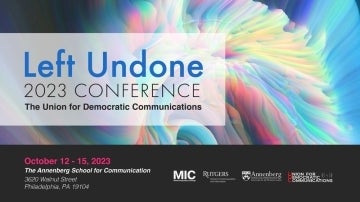
2023 Union for Democratic Communications Conference
- Annenberg School for Communication
The 2023 UDC conference in Philadelphia will be hosted by the Media, Inequality, and Change (MIC) Center, a collaboration between the University of Pennsylvania’s Annenberg School for Communication and Rutgers University’s School of Communication and Information.
Conference Theme: Left Undone
The possibilities and perils of leftist organizing and media scholarship assume greater urgency in the face of “backsliding democracy.” ‘Undone’ reflects numerous senses: as a temporary disunity; as an important task unfinished; as a representation of disarray; but all senses of the word hold hope for its reversal. The UDC has always stood as a site of collaboration between activists, scholars, and practitioners—an organization rooted in critical scholarship and practice about the structures of communication themselves, not just in the US, but worldwide. The 2023 conference will see us look back at the first 40 years of the UDC, but we will also look ahead to consider the role of critical communication scholarship and activism in organizing, engaging, and energizing leftist alternatives to authoritarian politics.
Our world has been reshaped by a powerful neoliberal vision made material through deliberate organizing, politicking, and institution-building; as economic historians such as Philip Mirowski have noted, the political left's response has not been sufficient to meet this challenge. A global climate crisis is joined by new wars, inflation, supply chain crises, and algorithmic governance across private and public spheres. Democratic institutions—and even the notion of democracy itself—are under attacks on multiple fronts, as right-wing movements globally have been energized. Media platforms and discourses are fertile ground for anti-democratic groups which have garnered funding and media attention that has seen formerly-fringe beliefs move toward the mainstream.
This year’s Union for Democratic Communications conference asks what role critical scholarship, media-making, and activism can play in organizing resistance to minority rule and authoritarian movements both in the U.S. and abroad. Left Undone thus proposes a two-part call for clarity. For one, as we enter the next 40 years of UDC, it is time to engage challenging conversations among critical scholars across political economy, critical and cultural studies, science and technology studies, critical sociology, and their complementary fields to ask if a different foundation can be reshaped and built. What role can critical communication scholarship and activism play in organizing resistance to authoritarian movements both in the U.S. and abroad? What new theorization might be necessary to guide activism in the decades ahead?
For the other, the work of the UDC and all scholar/activist organizations has always been one of struggle and persistence. Advocacy for equal justice, fair representation, and radical democracy is always an incomplete project. Both material and discursive attacks on the left have sought to undo what progress has been made and forestall the momentum of progressive and radical movements. What strategies, from micropolitics to international social movements, are required to combat widespread shifts towards authoritarian and anti-democratic regimes? Critical media-makers, scholars, and activists are invited to reimagine, reinvent, and reclaim communication for democracy–for the people–through the inherent optimism of criticality.
The conference will bring together scholars, practitioners, media makers, and activists to present on topics pertaining to the above issues. These include, but are not limited to:
-
Political economy of communications, communications policy, and media production
-
Digital capitalism, neoliberalism, “mutant neoliberalism”, and labor
-
International media content, structure, policy, and (in)equality
-
Algorithmic governance, discrimination, surveillance, privacy, and policy
-
Platform governance, cooperativism, and commons
-
Democratic theory and new critical theory
-
Critical law and policy studies; law and political economy
-
The crisis in journalism, fake news, and disinformation
-
Science and technology studies, cultural studies
-
Racisms, patriarchies, and other forms of algorithmically-intensified power formations
-
Power, marginalization, inequality, and justice
-
Activism, social justice, resistance, and media/tech activism
-
Communication, labor, working class, and activist history
-
Advertising and consumer culture
-
Pedagogy, academic freedom, and academic labor
-
Conflict, war, rising authoritarianism/fascism and structures of communication
The opening plenary, “The History and Future of the UDC,” introduced by Victor Pickard, featured Paula Chakravartty, DeeDee Halleck, Chenjerai Kumanyika, and Deepa Kumar. The closing plenary, “Intellectual Labor and Economies of Knowledge,” included Mark Lloyd, Alison Hearn, Natalie Fenton, and Todd Wolfson on the panel.
The conference concluded with a keynote discussion with Dr. Christina Ceisel and 2023’s Dallas Smythe Award recipient, Dr. Safiya Noble.
Check out this article written by Hailey Reissman for more information on the history of UDC and its relationship to Annenberg.
Events
View AllDisclaimer: This event may be photographed and/or video recorded for archival, educational, and related promotional purposes. We also may share these video recordings through Annenberg's website or related platforms. Certain events may also be livestreamed. By attending or participating in this event, you are giving your consent to be photographed and/or video recorded and you are waiving any and all claims regarding the use of your image by the Annenberg School for Communication. The Annenberg School for Communication, at its discretion, may provide a copy of the photos/footage upon written request.
